HI6025 - Analyzing the Impact of IFRS on Asset/Liability Reporting
VerifiedAdded on 2024/06/03
|13
|2583
|266
Report
AI Summary
This report examines the changes in asset and liability reporting following the adoption of International Financial Reporting Standards (IFRS), focusing on the Australian context. It contrasts financial reports before and after IFRS adoption, using Woolworths as a case study to illustrate the impact on long-term capital items, depreciation, revenue recognition, employee benefits, and borrowing costs. The report highlights how IFRS implementation has led to increased liabilities, decreased surplus profits, and a more accurate depreciation accounting. Ultimately, the adoption of IFRS has enhanced the comparability of financial reporting among Australian enterprises and improved investor confidence, leading to more informed financial decision-making.
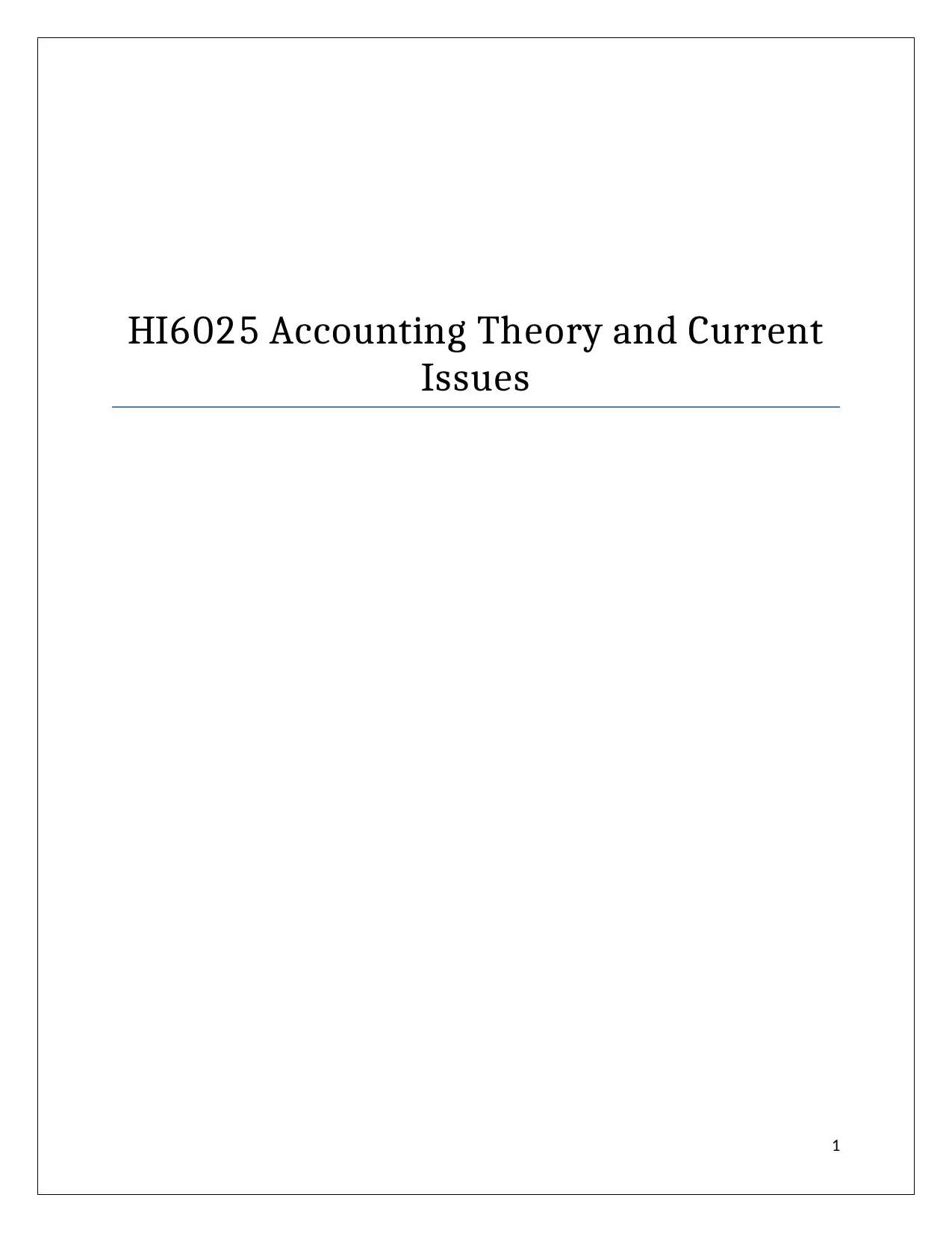
HI6025 Accounting Theory and Current
Issues
1
Issues
1
Paraphrase This Document
Need a fresh take? Get an instant paraphrase of this document with our AI Paraphraser
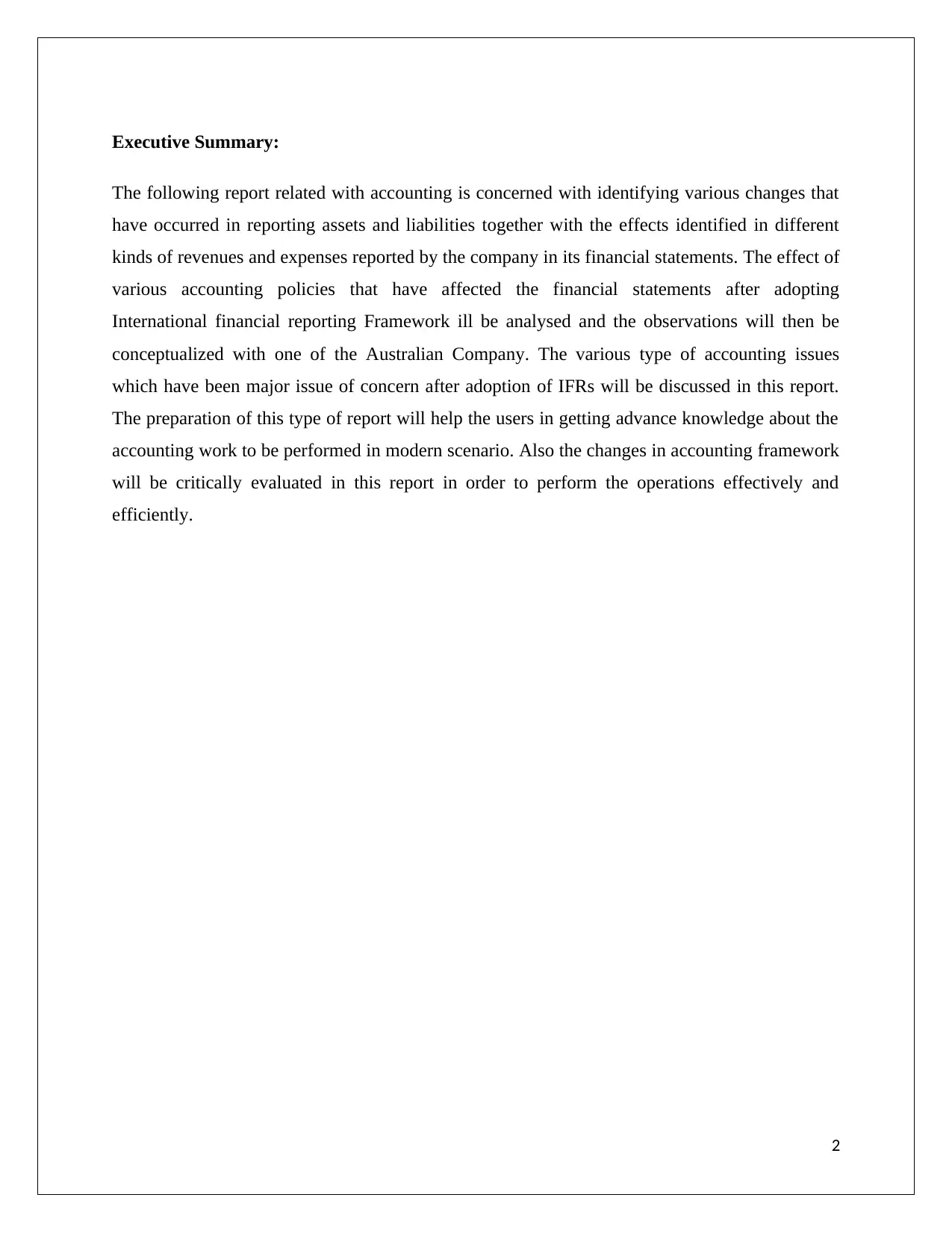
Executive Summary:
The following report related with accounting is concerned with identifying various changes that
have occurred in reporting assets and liabilities together with the effects identified in different
kinds of revenues and expenses reported by the company in its financial statements. The effect of
various accounting policies that have affected the financial statements after adopting
International financial reporting Framework ill be analysed and the observations will then be
conceptualized with one of the Australian Company. The various type of accounting issues
which have been major issue of concern after adoption of IFRs will be discussed in this report.
The preparation of this type of report will help the users in getting advance knowledge about the
accounting work to be performed in modern scenario. Also the changes in accounting framework
will be critically evaluated in this report in order to perform the operations effectively and
efficiently.
2
The following report related with accounting is concerned with identifying various changes that
have occurred in reporting assets and liabilities together with the effects identified in different
kinds of revenues and expenses reported by the company in its financial statements. The effect of
various accounting policies that have affected the financial statements after adopting
International financial reporting Framework ill be analysed and the observations will then be
conceptualized with one of the Australian Company. The various type of accounting issues
which have been major issue of concern after adoption of IFRs will be discussed in this report.
The preparation of this type of report will help the users in getting advance knowledge about the
accounting work to be performed in modern scenario. Also the changes in accounting framework
will be critically evaluated in this report in order to perform the operations effectively and
efficiently.
2
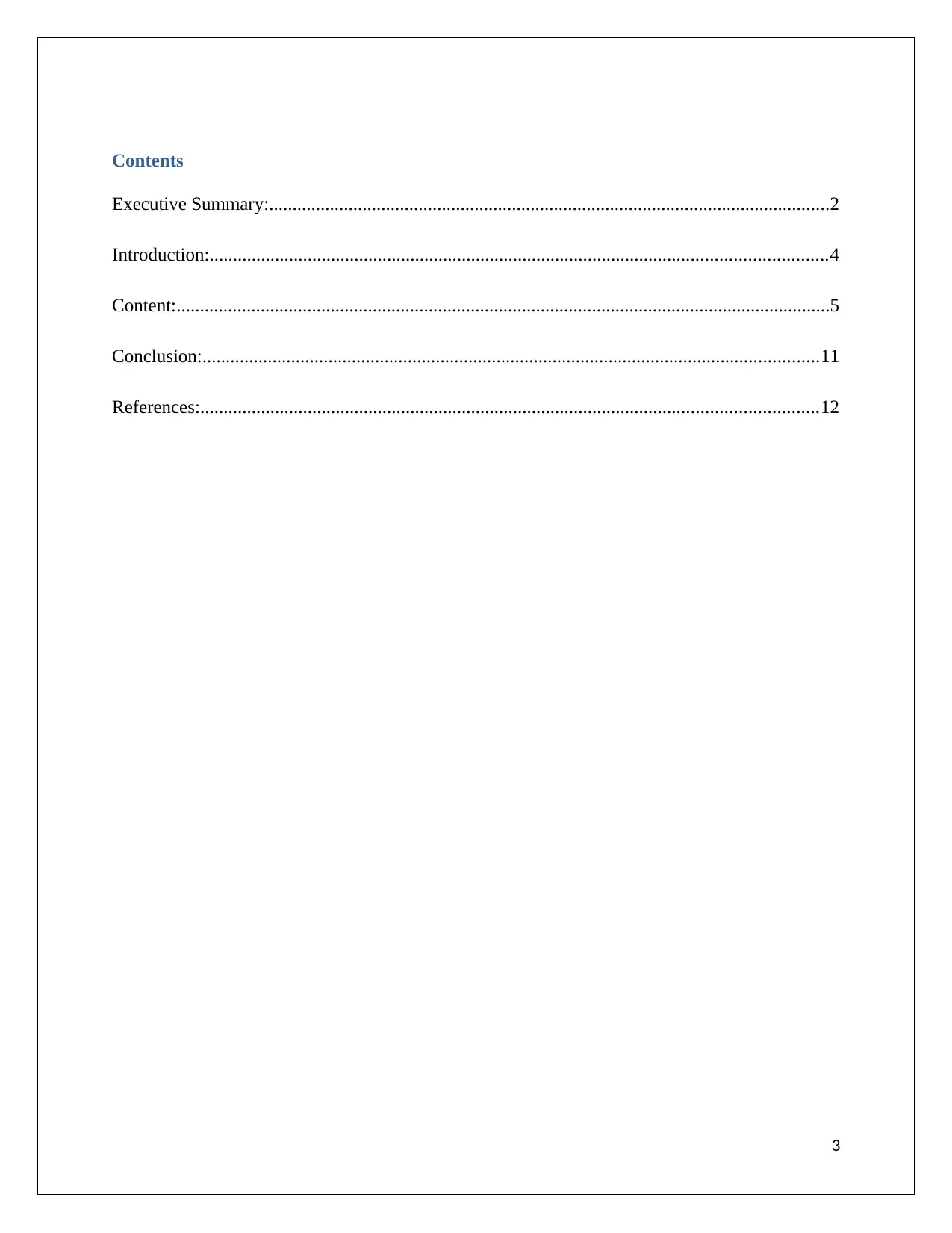
Contents
Executive Summary:........................................................................................................................2
Introduction:....................................................................................................................................4
Content:............................................................................................................................................5
Conclusion:....................................................................................................................................11
References:....................................................................................................................................12
3
Executive Summary:........................................................................................................................2
Introduction:....................................................................................................................................4
Content:............................................................................................................................................5
Conclusion:....................................................................................................................................11
References:....................................................................................................................................12
3
⊘ This is a preview!⊘
Do you want full access?
Subscribe today to unlock all pages.

Trusted by 1+ million students worldwide
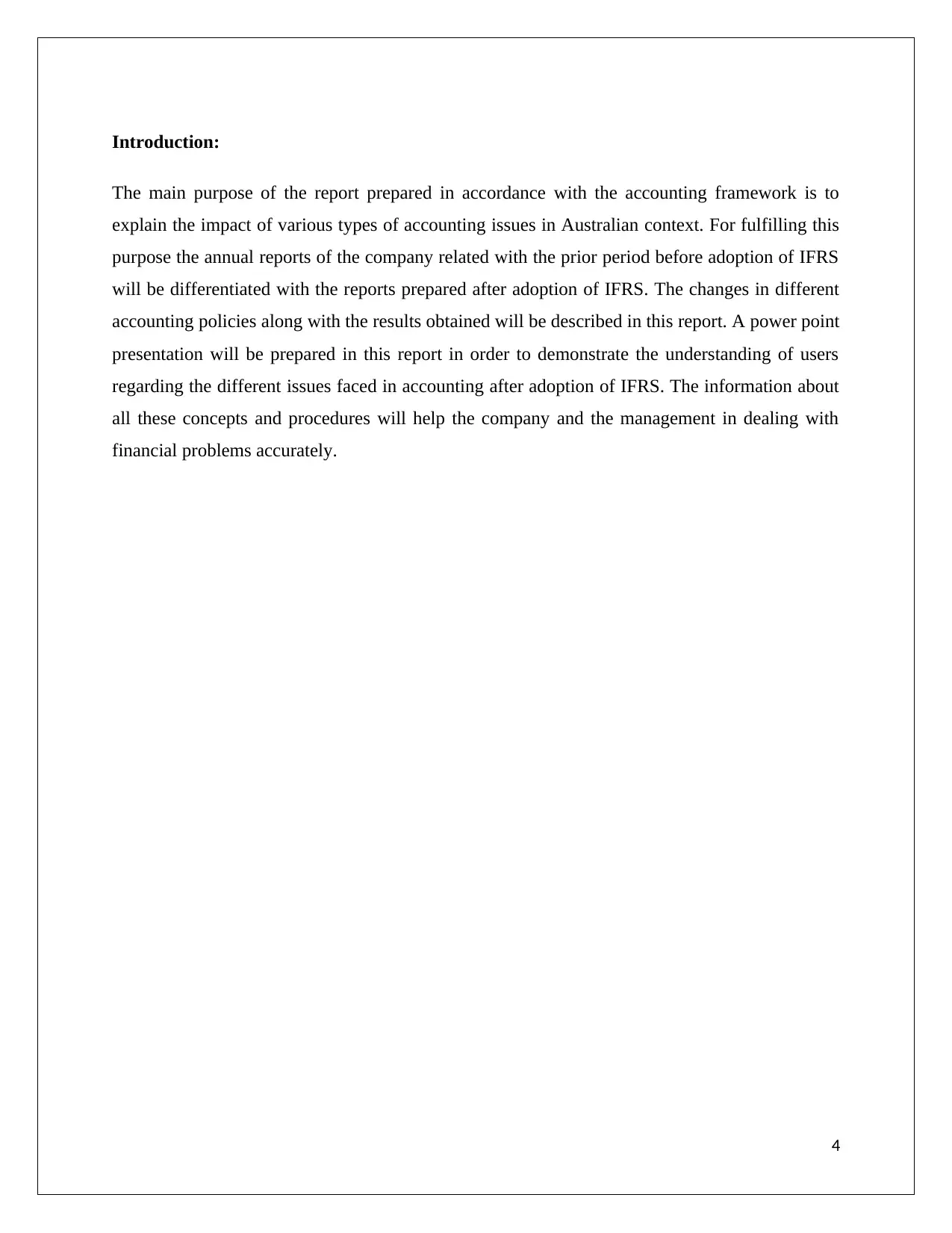
Introduction:
The main purpose of the report prepared in accordance with the accounting framework is to
explain the impact of various types of accounting issues in Australian context. For fulfilling this
purpose the annual reports of the company related with the prior period before adoption of IFRS
will be differentiated with the reports prepared after adoption of IFRS. The changes in different
accounting policies along with the results obtained will be described in this report. A power point
presentation will be prepared in this report in order to demonstrate the understanding of users
regarding the different issues faced in accounting after adoption of IFRS. The information about
all these concepts and procedures will help the company and the management in dealing with
financial problems accurately.
4
The main purpose of the report prepared in accordance with the accounting framework is to
explain the impact of various types of accounting issues in Australian context. For fulfilling this
purpose the annual reports of the company related with the prior period before adoption of IFRS
will be differentiated with the reports prepared after adoption of IFRS. The changes in different
accounting policies along with the results obtained will be described in this report. A power point
presentation will be prepared in this report in order to demonstrate the understanding of users
regarding the different issues faced in accounting after adoption of IFRS. The information about
all these concepts and procedures will help the company and the management in dealing with
financial problems accurately.
4
Paraphrase This Document
Need a fresh take? Get an instant paraphrase of this document with our AI Paraphraser
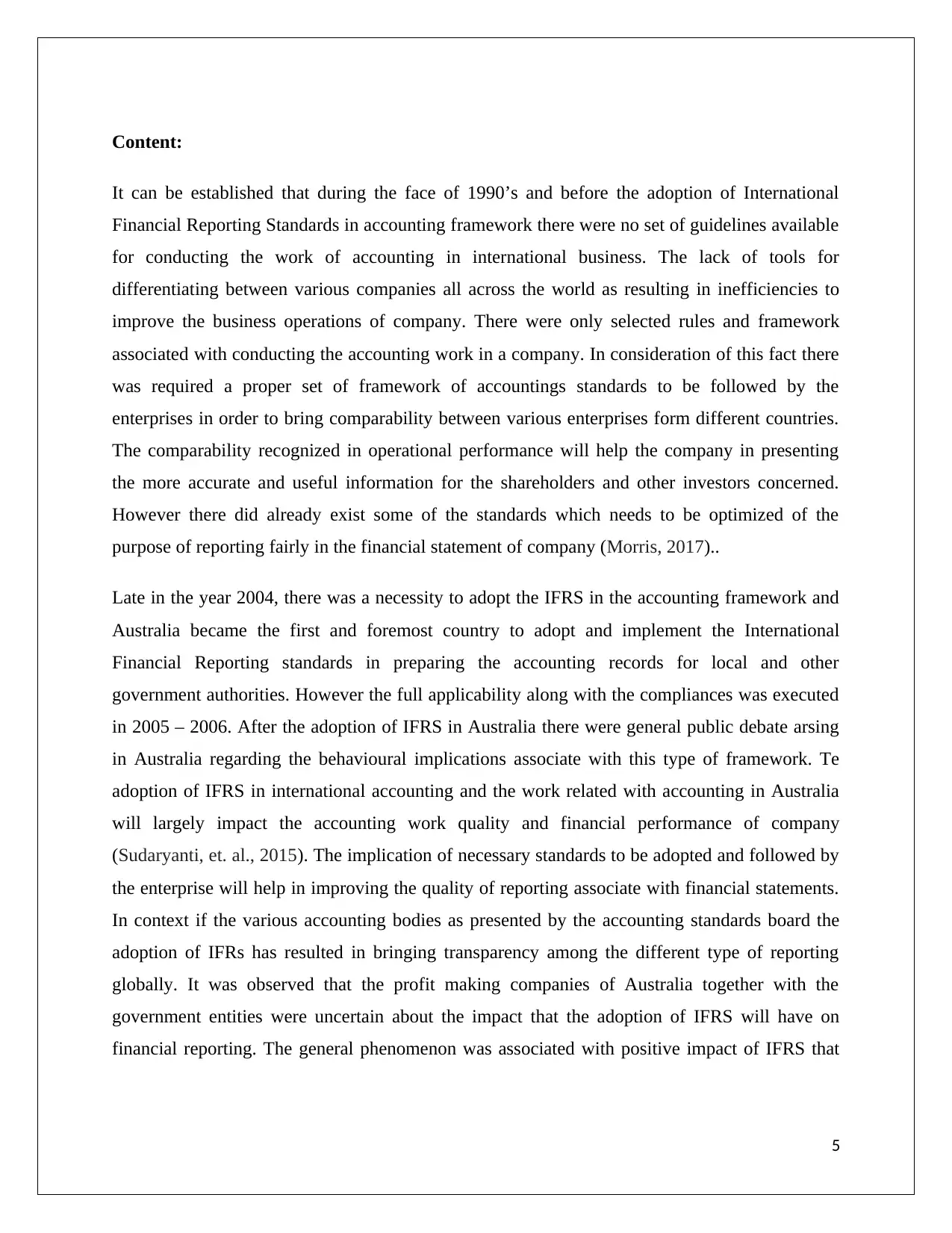
Content:
It can be established that during the face of 1990’s and before the adoption of International
Financial Reporting Standards in accounting framework there were no set of guidelines available
for conducting the work of accounting in international business. The lack of tools for
differentiating between various companies all across the world as resulting in inefficiencies to
improve the business operations of company. There were only selected rules and framework
associated with conducting the accounting work in a company. In consideration of this fact there
was required a proper set of framework of accountings standards to be followed by the
enterprises in order to bring comparability between various enterprises form different countries.
The comparability recognized in operational performance will help the company in presenting
the more accurate and useful information for the shareholders and other investors concerned.
However there did already exist some of the standards which needs to be optimized of the
purpose of reporting fairly in the financial statement of company (Morris, 2017)..
Late in the year 2004, there was a necessity to adopt the IFRS in the accounting framework and
Australia became the first and foremost country to adopt and implement the International
Financial Reporting standards in preparing the accounting records for local and other
government authorities. However the full applicability along with the compliances was executed
in 2005 – 2006. After the adoption of IFRS in Australia there were general public debate arsing
in Australia regarding the behavioural implications associate with this type of framework. Te
adoption of IFRS in international accounting and the work related with accounting in Australia
will largely impact the accounting work quality and financial performance of company
(Sudaryanti, et. al., 2015). The implication of necessary standards to be adopted and followed by
the enterprise will help in improving the quality of reporting associate with financial statements.
In context if the various accounting bodies as presented by the accounting standards board the
adoption of IFRs has resulted in bringing transparency among the different type of reporting
globally. It was observed that the profit making companies of Australia together with the
government entities were uncertain about the impact that the adoption of IFRS will have on
financial reporting. The general phenomenon was associated with positive impact of IFRS that
5
It can be established that during the face of 1990’s and before the adoption of International
Financial Reporting Standards in accounting framework there were no set of guidelines available
for conducting the work of accounting in international business. The lack of tools for
differentiating between various companies all across the world as resulting in inefficiencies to
improve the business operations of company. There were only selected rules and framework
associated with conducting the accounting work in a company. In consideration of this fact there
was required a proper set of framework of accountings standards to be followed by the
enterprises in order to bring comparability between various enterprises form different countries.
The comparability recognized in operational performance will help the company in presenting
the more accurate and useful information for the shareholders and other investors concerned.
However there did already exist some of the standards which needs to be optimized of the
purpose of reporting fairly in the financial statement of company (Morris, 2017)..
Late in the year 2004, there was a necessity to adopt the IFRS in the accounting framework and
Australia became the first and foremost country to adopt and implement the International
Financial Reporting standards in preparing the accounting records for local and other
government authorities. However the full applicability along with the compliances was executed
in 2005 – 2006. After the adoption of IFRS in Australia there were general public debate arsing
in Australia regarding the behavioural implications associate with this type of framework. Te
adoption of IFRS in international accounting and the work related with accounting in Australia
will largely impact the accounting work quality and financial performance of company
(Sudaryanti, et. al., 2015). The implication of necessary standards to be adopted and followed by
the enterprise will help in improving the quality of reporting associate with financial statements.
In context if the various accounting bodies as presented by the accounting standards board the
adoption of IFRs has resulted in bringing transparency among the different type of reporting
globally. It was observed that the profit making companies of Australia together with the
government entities were uncertain about the impact that the adoption of IFRS will have on
financial reporting. The general phenomenon was associated with positive impact of IFRS that
5
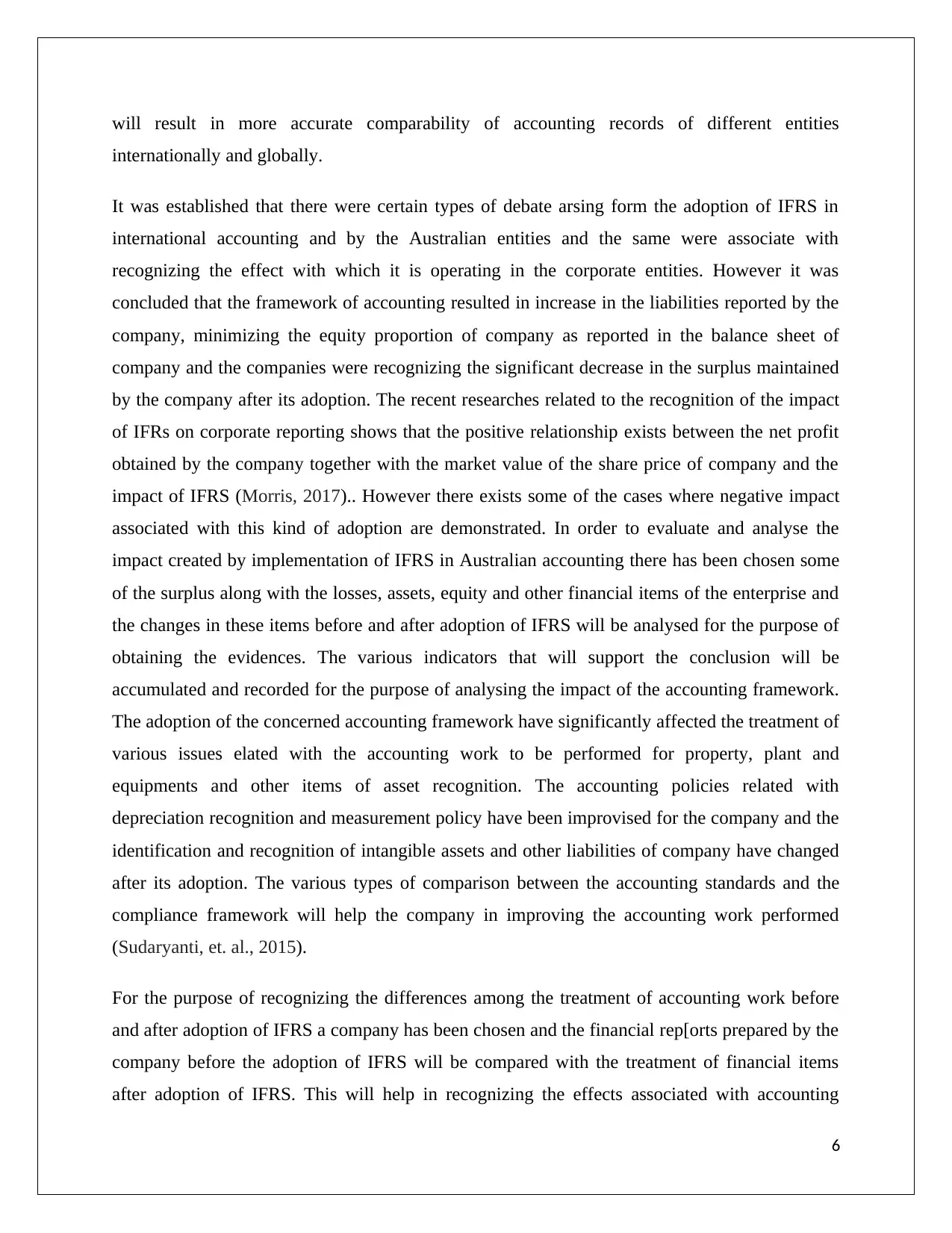
will result in more accurate comparability of accounting records of different entities
internationally and globally.
It was established that there were certain types of debate arsing form the adoption of IFRS in
international accounting and by the Australian entities and the same were associate with
recognizing the effect with which it is operating in the corporate entities. However it was
concluded that the framework of accounting resulted in increase in the liabilities reported by the
company, minimizing the equity proportion of company as reported in the balance sheet of
company and the companies were recognizing the significant decrease in the surplus maintained
by the company after its adoption. The recent researches related to the recognition of the impact
of IFRs on corporate reporting shows that the positive relationship exists between the net profit
obtained by the company together with the market value of the share price of company and the
impact of IFRS (Morris, 2017).. However there exists some of the cases where negative impact
associated with this kind of adoption are demonstrated. In order to evaluate and analyse the
impact created by implementation of IFRS in Australian accounting there has been chosen some
of the surplus along with the losses, assets, equity and other financial items of the enterprise and
the changes in these items before and after adoption of IFRS will be analysed for the purpose of
obtaining the evidences. The various indicators that will support the conclusion will be
accumulated and recorded for the purpose of analysing the impact of the accounting framework.
The adoption of the concerned accounting framework have significantly affected the treatment of
various issues elated with the accounting work to be performed for property, plant and
equipments and other items of asset recognition. The accounting policies related with
depreciation recognition and measurement policy have been improvised for the company and the
identification and recognition of intangible assets and other liabilities of company have changed
after its adoption. The various types of comparison between the accounting standards and the
compliance framework will help the company in improving the accounting work performed
(Sudaryanti, et. al., 2015).
For the purpose of recognizing the differences among the treatment of accounting work before
and after adoption of IFRS a company has been chosen and the financial rep[orts prepared by the
company before the adoption of IFRS will be compared with the treatment of financial items
after adoption of IFRS. This will help in recognizing the effects associated with accounting
6
internationally and globally.
It was established that there were certain types of debate arsing form the adoption of IFRS in
international accounting and by the Australian entities and the same were associate with
recognizing the effect with which it is operating in the corporate entities. However it was
concluded that the framework of accounting resulted in increase in the liabilities reported by the
company, minimizing the equity proportion of company as reported in the balance sheet of
company and the companies were recognizing the significant decrease in the surplus maintained
by the company after its adoption. The recent researches related to the recognition of the impact
of IFRs on corporate reporting shows that the positive relationship exists between the net profit
obtained by the company together with the market value of the share price of company and the
impact of IFRS (Morris, 2017).. However there exists some of the cases where negative impact
associated with this kind of adoption are demonstrated. In order to evaluate and analyse the
impact created by implementation of IFRS in Australian accounting there has been chosen some
of the surplus along with the losses, assets, equity and other financial items of the enterprise and
the changes in these items before and after adoption of IFRS will be analysed for the purpose of
obtaining the evidences. The various indicators that will support the conclusion will be
accumulated and recorded for the purpose of analysing the impact of the accounting framework.
The adoption of the concerned accounting framework have significantly affected the treatment of
various issues elated with the accounting work to be performed for property, plant and
equipments and other items of asset recognition. The accounting policies related with
depreciation recognition and measurement policy have been improvised for the company and the
identification and recognition of intangible assets and other liabilities of company have changed
after its adoption. The various types of comparison between the accounting standards and the
compliance framework will help the company in improving the accounting work performed
(Sudaryanti, et. al., 2015).
For the purpose of recognizing the differences among the treatment of accounting work before
and after adoption of IFRS a company has been chosen and the financial rep[orts prepared by the
company before the adoption of IFRS will be compared with the treatment of financial items
after adoption of IFRS. This will help in recognizing the effects associated with accounting
6
⊘ This is a preview!⊘
Do you want full access?
Subscribe today to unlock all pages.

Trusted by 1+ million students worldwide
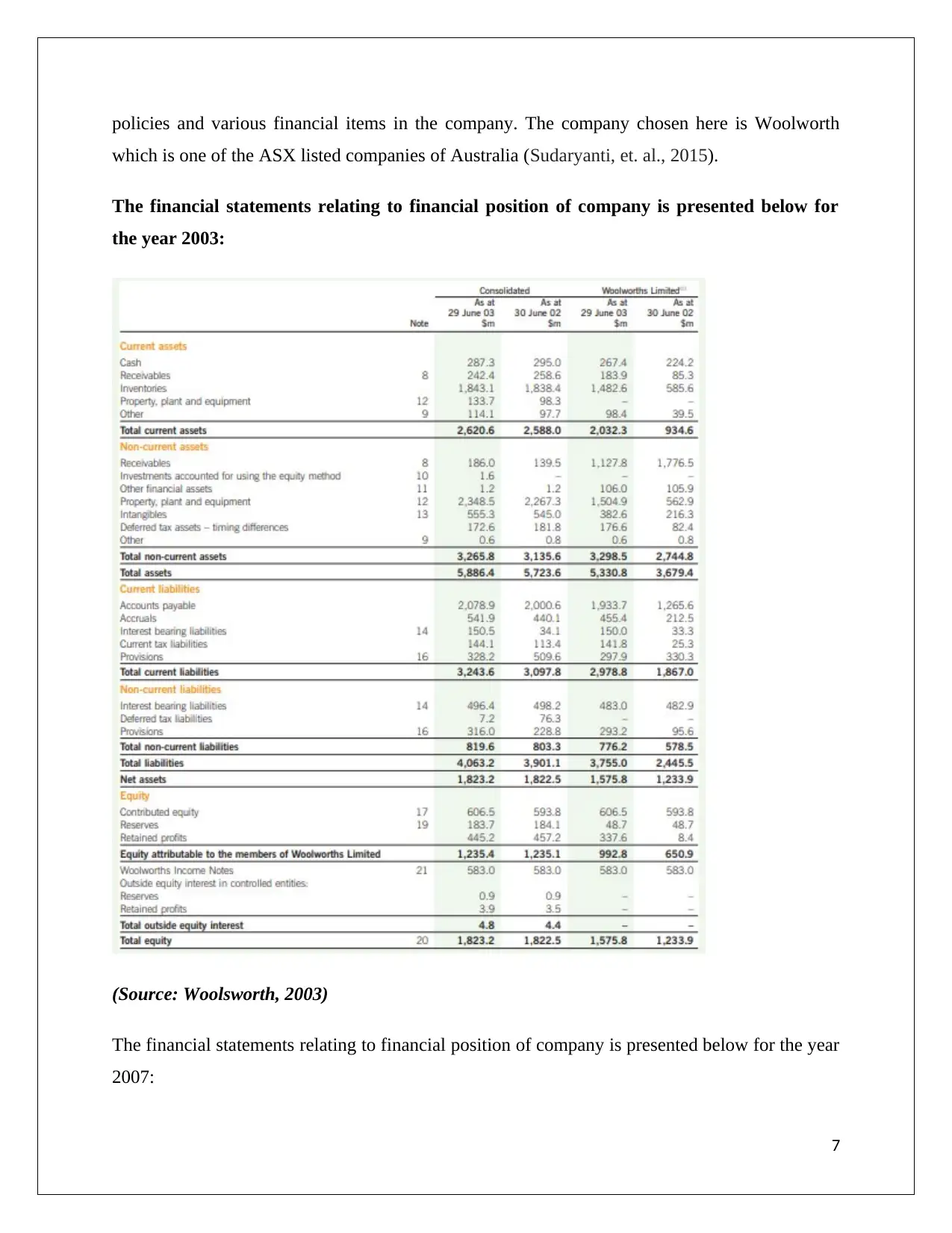
policies and various financial items in the company. The company chosen here is Woolworth
which is one of the ASX listed companies of Australia (Sudaryanti, et. al., 2015).
The financial statements relating to financial position of company is presented below for
the year 2003:
(Source: Woolsworth, 2003)
The financial statements relating to financial position of company is presented below for the year
2007:
7
which is one of the ASX listed companies of Australia (Sudaryanti, et. al., 2015).
The financial statements relating to financial position of company is presented below for
the year 2003:
(Source: Woolsworth, 2003)
The financial statements relating to financial position of company is presented below for the year
2007:
7
Paraphrase This Document
Need a fresh take? Get an instant paraphrase of this document with our AI Paraphraser
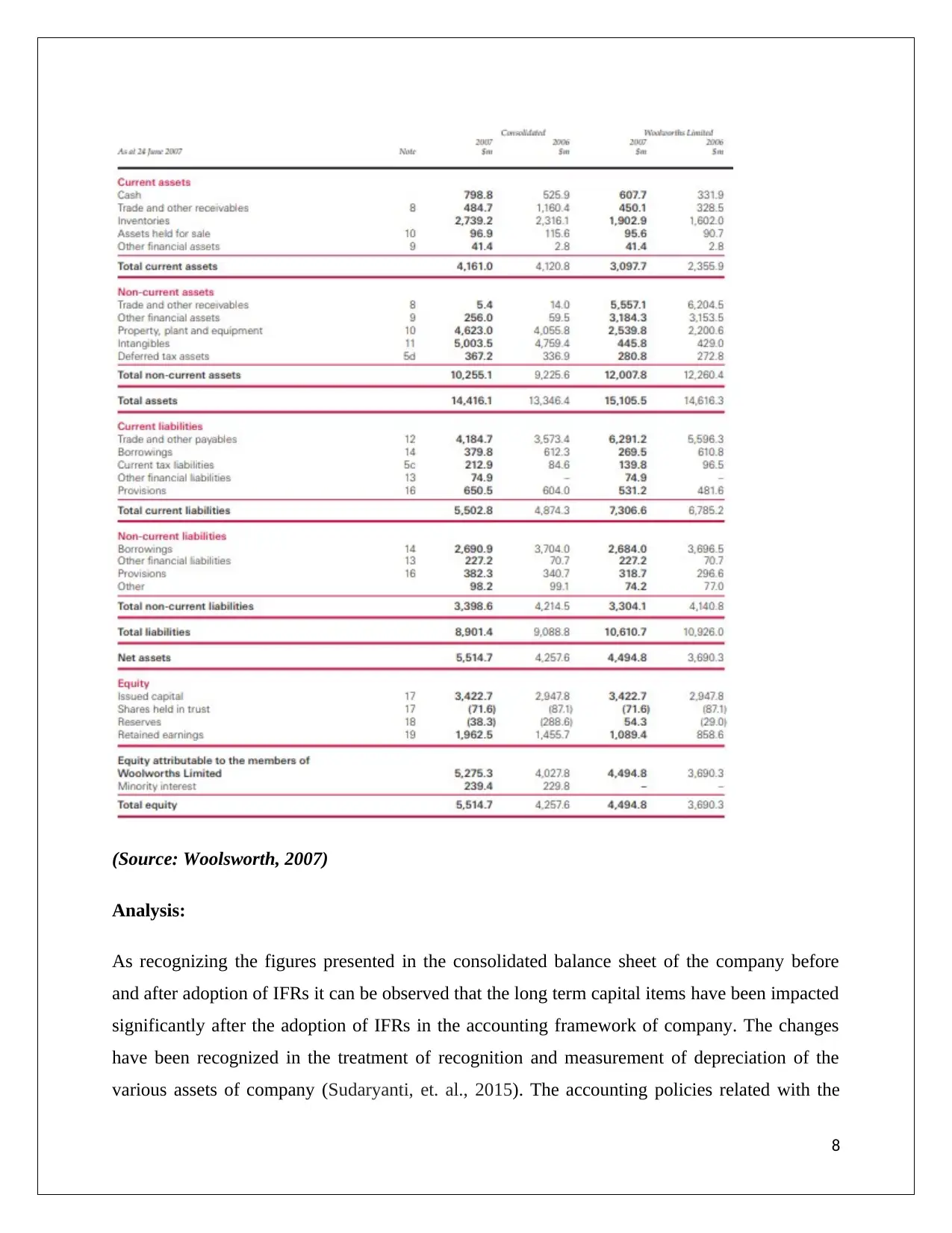
(Source: Woolsworth, 2007)
Analysis:
As recognizing the figures presented in the consolidated balance sheet of the company before
and after adoption of IFRs it can be observed that the long term capital items have been impacted
significantly after the adoption of IFRs in the accounting framework of company. The changes
have been recognized in the treatment of recognition and measurement of depreciation of the
various assets of company (Sudaryanti, et. al., 2015). The accounting policies related with the
8
Analysis:
As recognizing the figures presented in the consolidated balance sheet of the company before
and after adoption of IFRs it can be observed that the long term capital items have been impacted
significantly after the adoption of IFRs in the accounting framework of company. The changes
have been recognized in the treatment of recognition and measurement of depreciation of the
various assets of company (Sudaryanti, et. al., 2015). The accounting policies related with the
8
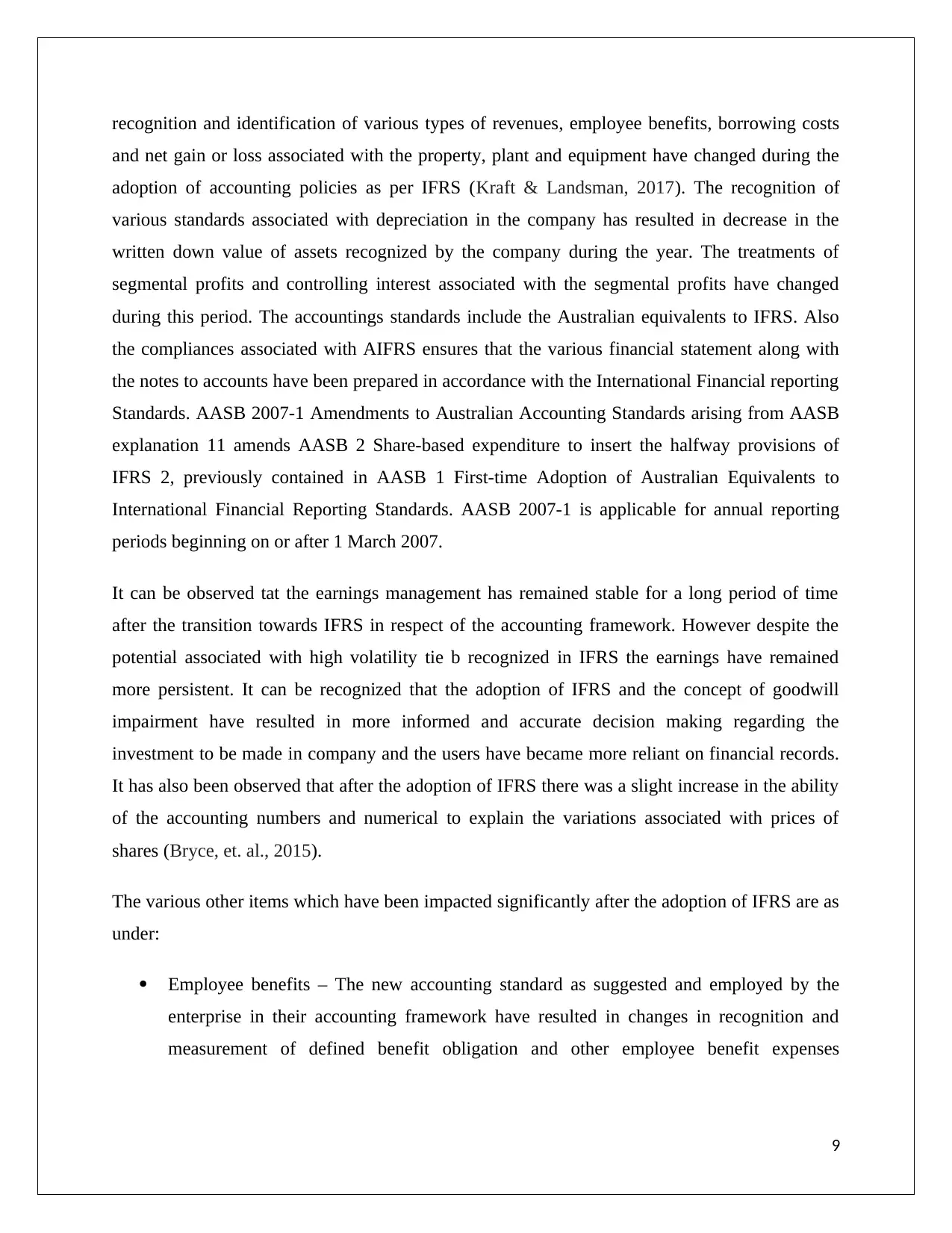
recognition and identification of various types of revenues, employee benefits, borrowing costs
and net gain or loss associated with the property, plant and equipment have changed during the
adoption of accounting policies as per IFRS (Kraft & Landsman, 2017). The recognition of
various standards associated with depreciation in the company has resulted in decrease in the
written down value of assets recognized by the company during the year. The treatments of
segmental profits and controlling interest associated with the segmental profits have changed
during this period. The accountings standards include the Australian equivalents to IFRS. Also
the compliances associated with AIFRS ensures that the various financial statement along with
the notes to accounts have been prepared in accordance with the International Financial reporting
Standards. AASB 2007-1 Amendments to Australian Accounting Standards arising from AASB
explanation 11 amends AASB 2 Share-based expenditure to insert the halfway provisions of
IFRS 2, previously contained in AASB 1 First-time Adoption of Australian Equivalents to
International Financial Reporting Standards. AASB 2007-1 is applicable for annual reporting
periods beginning on or after 1 March 2007.
It can be observed tat the earnings management has remained stable for a long period of time
after the transition towards IFRS in respect of the accounting framework. However despite the
potential associated with high volatility tie b recognized in IFRS the earnings have remained
more persistent. It can be recognized that the adoption of IFRS and the concept of goodwill
impairment have resulted in more informed and accurate decision making regarding the
investment to be made in company and the users have became more reliant on financial records.
It has also been observed that after the adoption of IFRS there was a slight increase in the ability
of the accounting numbers and numerical to explain the variations associated with prices of
shares (Bryce, et. al., 2015).
The various other items which have been impacted significantly after the adoption of IFRS are as
under:
Employee benefits – The new accounting standard as suggested and employed by the
enterprise in their accounting framework have resulted in changes in recognition and
measurement of defined benefit obligation and other employee benefit expenses
9
and net gain or loss associated with the property, plant and equipment have changed during the
adoption of accounting policies as per IFRS (Kraft & Landsman, 2017). The recognition of
various standards associated with depreciation in the company has resulted in decrease in the
written down value of assets recognized by the company during the year. The treatments of
segmental profits and controlling interest associated with the segmental profits have changed
during this period. The accountings standards include the Australian equivalents to IFRS. Also
the compliances associated with AIFRS ensures that the various financial statement along with
the notes to accounts have been prepared in accordance with the International Financial reporting
Standards. AASB 2007-1 Amendments to Australian Accounting Standards arising from AASB
explanation 11 amends AASB 2 Share-based expenditure to insert the halfway provisions of
IFRS 2, previously contained in AASB 1 First-time Adoption of Australian Equivalents to
International Financial Reporting Standards. AASB 2007-1 is applicable for annual reporting
periods beginning on or after 1 March 2007.
It can be observed tat the earnings management has remained stable for a long period of time
after the transition towards IFRS in respect of the accounting framework. However despite the
potential associated with high volatility tie b recognized in IFRS the earnings have remained
more persistent. It can be recognized that the adoption of IFRS and the concept of goodwill
impairment have resulted in more informed and accurate decision making regarding the
investment to be made in company and the users have became more reliant on financial records.
It has also been observed that after the adoption of IFRS there was a slight increase in the ability
of the accounting numbers and numerical to explain the variations associated with prices of
shares (Bryce, et. al., 2015).
The various other items which have been impacted significantly after the adoption of IFRS are as
under:
Employee benefits – The new accounting standard as suggested and employed by the
enterprise in their accounting framework have resulted in changes in recognition and
measurement of defined benefit obligation and other employee benefit expenses
9
⊘ This is a preview!⊘
Do you want full access?
Subscribe today to unlock all pages.

Trusted by 1+ million students worldwide
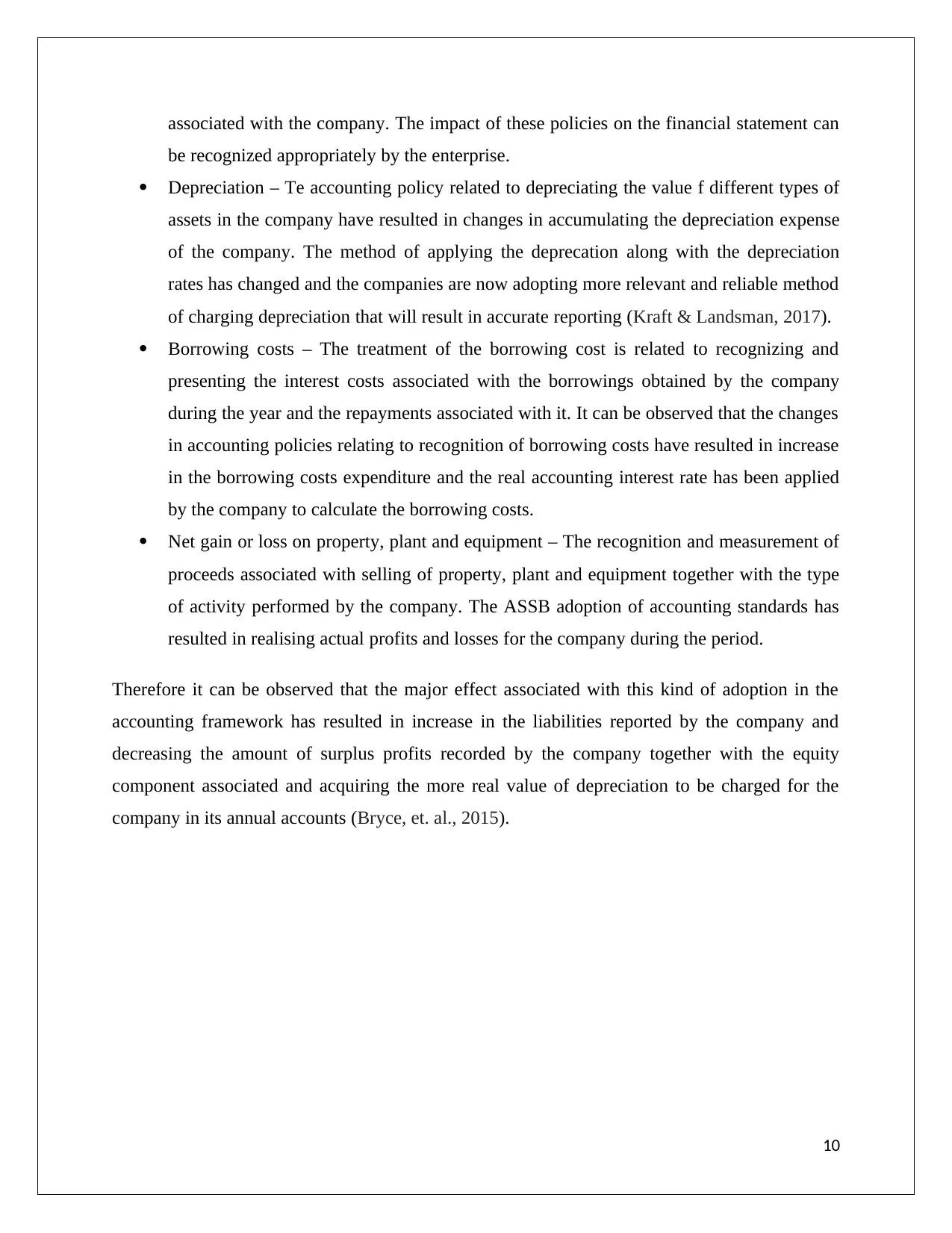
associated with the company. The impact of these policies on the financial statement can
be recognized appropriately by the enterprise.
Depreciation – Te accounting policy related to depreciating the value f different types of
assets in the company have resulted in changes in accumulating the depreciation expense
of the company. The method of applying the deprecation along with the depreciation
rates has changed and the companies are now adopting more relevant and reliable method
of charging depreciation that will result in accurate reporting (Kraft & Landsman, 2017).
Borrowing costs – The treatment of the borrowing cost is related to recognizing and
presenting the interest costs associated with the borrowings obtained by the company
during the year and the repayments associated with it. It can be observed that the changes
in accounting policies relating to recognition of borrowing costs have resulted in increase
in the borrowing costs expenditure and the real accounting interest rate has been applied
by the company to calculate the borrowing costs.
Net gain or loss on property, plant and equipment – The recognition and measurement of
proceeds associated with selling of property, plant and equipment together with the type
of activity performed by the company. The ASSB adoption of accounting standards has
resulted in realising actual profits and losses for the company during the period.
Therefore it can be observed that the major effect associated with this kind of adoption in the
accounting framework has resulted in increase in the liabilities reported by the company and
decreasing the amount of surplus profits recorded by the company together with the equity
component associated and acquiring the more real value of depreciation to be charged for the
company in its annual accounts (Bryce, et. al., 2015).
10
be recognized appropriately by the enterprise.
Depreciation – Te accounting policy related to depreciating the value f different types of
assets in the company have resulted in changes in accumulating the depreciation expense
of the company. The method of applying the deprecation along with the depreciation
rates has changed and the companies are now adopting more relevant and reliable method
of charging depreciation that will result in accurate reporting (Kraft & Landsman, 2017).
Borrowing costs – The treatment of the borrowing cost is related to recognizing and
presenting the interest costs associated with the borrowings obtained by the company
during the year and the repayments associated with it. It can be observed that the changes
in accounting policies relating to recognition of borrowing costs have resulted in increase
in the borrowing costs expenditure and the real accounting interest rate has been applied
by the company to calculate the borrowing costs.
Net gain or loss on property, plant and equipment – The recognition and measurement of
proceeds associated with selling of property, plant and equipment together with the type
of activity performed by the company. The ASSB adoption of accounting standards has
resulted in realising actual profits and losses for the company during the period.
Therefore it can be observed that the major effect associated with this kind of adoption in the
accounting framework has resulted in increase in the liabilities reported by the company and
decreasing the amount of surplus profits recorded by the company together with the equity
component associated and acquiring the more real value of depreciation to be charged for the
company in its annual accounts (Bryce, et. al., 2015).
10
Paraphrase This Document
Need a fresh take? Get an instant paraphrase of this document with our AI Paraphraser
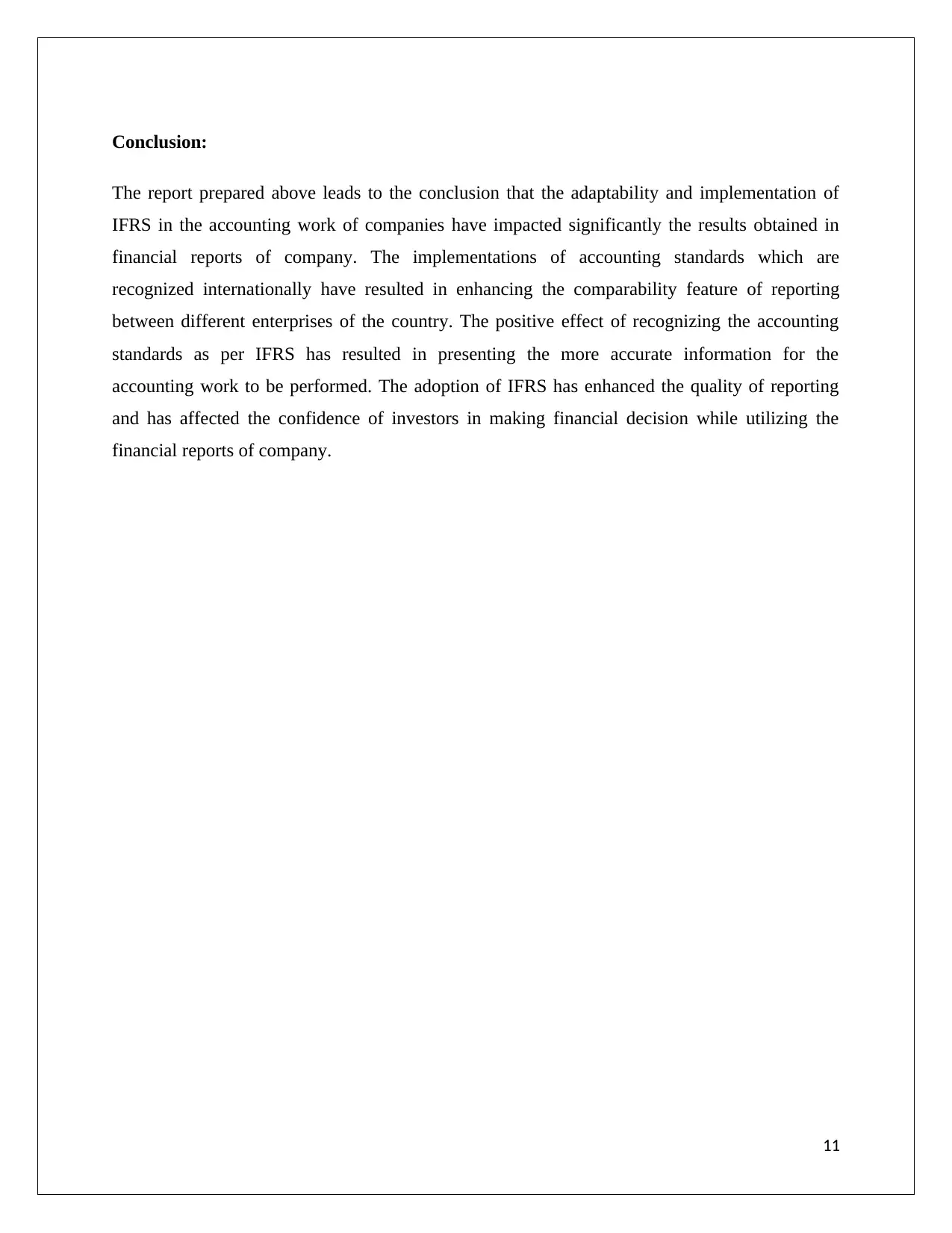
Conclusion:
The report prepared above leads to the conclusion that the adaptability and implementation of
IFRS in the accounting work of companies have impacted significantly the results obtained in
financial reports of company. The implementations of accounting standards which are
recognized internationally have resulted in enhancing the comparability feature of reporting
between different enterprises of the country. The positive effect of recognizing the accounting
standards as per IFRS has resulted in presenting the more accurate information for the
accounting work to be performed. The adoption of IFRS has enhanced the quality of reporting
and has affected the confidence of investors in making financial decision while utilizing the
financial reports of company.
11
The report prepared above leads to the conclusion that the adaptability and implementation of
IFRS in the accounting work of companies have impacted significantly the results obtained in
financial reports of company. The implementations of accounting standards which are
recognized internationally have resulted in enhancing the comparability feature of reporting
between different enterprises of the country. The positive effect of recognizing the accounting
standards as per IFRS has resulted in presenting the more accurate information for the
accounting work to be performed. The adoption of IFRS has enhanced the quality of reporting
and has affected the confidence of investors in making financial decision while utilizing the
financial reports of company.
11
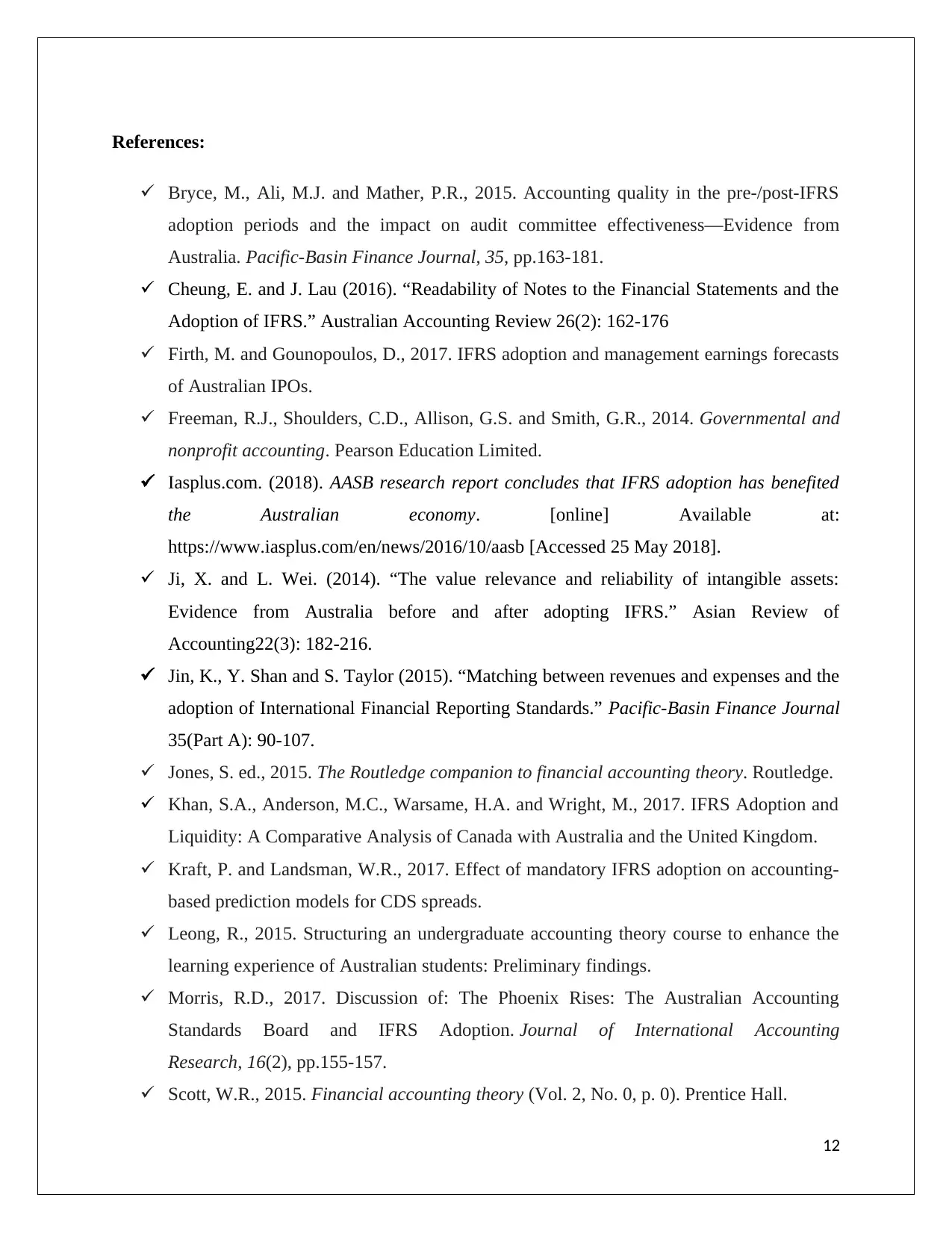
References:
Bryce, M., Ali, M.J. and Mather, P.R., 2015. Accounting quality in the pre-/post-IFRS
adoption periods and the impact on audit committee effectiveness—Evidence from
Australia. Pacific-Basin Finance Journal, 35, pp.163-181.
Cheung, E. and J. Lau (2016). “Readability of Notes to the Financial Statements and the
Adoption of IFRS.” Australian Accounting Review 26(2): 162-176
Firth, M. and Gounopoulos, D., 2017. IFRS adoption and management earnings forecasts
of Australian IPOs.
Freeman, R.J., Shoulders, C.D., Allison, G.S. and Smith, G.R., 2014. Governmental and
nonprofit accounting. Pearson Education Limited.
Iasplus.com. (2018). AASB research report concludes that IFRS adoption has benefited
the Australian economy. [online] Available at:
https://www.iasplus.com/en/news/2016/10/aasb [Accessed 25 May 2018].
Ji, X. and L. Wei. (2014). “The value relevance and reliability of intangible assets:
Evidence from Australia before and after adopting IFRS.” Asian Review of
Accounting22(3): 182-216.
Jin, K., Y. Shan and S. Taylor (2015). “Matching between revenues and expenses and the
adoption of International Financial Reporting Standards.” Pacific-Basin Finance Journal
35(Part A): 90-107.
Jones, S. ed., 2015. The Routledge companion to financial accounting theory. Routledge.
Khan, S.A., Anderson, M.C., Warsame, H.A. and Wright, M., 2017. IFRS Adoption and
Liquidity: A Comparative Analysis of Canada with Australia and the United Kingdom.
Kraft, P. and Landsman, W.R., 2017. Effect of mandatory IFRS adoption on accounting-
based prediction models for CDS spreads.
Leong, R., 2015. Structuring an undergraduate accounting theory course to enhance the
learning experience of Australian students: Preliminary findings.
Morris, R.D., 2017. Discussion of: The Phoenix Rises: The Australian Accounting
Standards Board and IFRS Adoption. Journal of International Accounting
Research, 16(2), pp.155-157.
Scott, W.R., 2015. Financial accounting theory (Vol. 2, No. 0, p. 0). Prentice Hall.
12
Bryce, M., Ali, M.J. and Mather, P.R., 2015. Accounting quality in the pre-/post-IFRS
adoption periods and the impact on audit committee effectiveness—Evidence from
Australia. Pacific-Basin Finance Journal, 35, pp.163-181.
Cheung, E. and J. Lau (2016). “Readability of Notes to the Financial Statements and the
Adoption of IFRS.” Australian Accounting Review 26(2): 162-176
Firth, M. and Gounopoulos, D., 2017. IFRS adoption and management earnings forecasts
of Australian IPOs.
Freeman, R.J., Shoulders, C.D., Allison, G.S. and Smith, G.R., 2014. Governmental and
nonprofit accounting. Pearson Education Limited.
Iasplus.com. (2018). AASB research report concludes that IFRS adoption has benefited
the Australian economy. [online] Available at:
https://www.iasplus.com/en/news/2016/10/aasb [Accessed 25 May 2018].
Ji, X. and L. Wei. (2014). “The value relevance and reliability of intangible assets:
Evidence from Australia before and after adopting IFRS.” Asian Review of
Accounting22(3): 182-216.
Jin, K., Y. Shan and S. Taylor (2015). “Matching between revenues and expenses and the
adoption of International Financial Reporting Standards.” Pacific-Basin Finance Journal
35(Part A): 90-107.
Jones, S. ed., 2015. The Routledge companion to financial accounting theory. Routledge.
Khan, S.A., Anderson, M.C., Warsame, H.A. and Wright, M., 2017. IFRS Adoption and
Liquidity: A Comparative Analysis of Canada with Australia and the United Kingdom.
Kraft, P. and Landsman, W.R., 2017. Effect of mandatory IFRS adoption on accounting-
based prediction models for CDS spreads.
Leong, R., 2015. Structuring an undergraduate accounting theory course to enhance the
learning experience of Australian students: Preliminary findings.
Morris, R.D., 2017. Discussion of: The Phoenix Rises: The Australian Accounting
Standards Board and IFRS Adoption. Journal of International Accounting
Research, 16(2), pp.155-157.
Scott, W.R., 2015. Financial accounting theory (Vol. 2, No. 0, p. 0). Prentice Hall.
12
⊘ This is a preview!⊘
Do you want full access?
Subscribe today to unlock all pages.

Trusted by 1+ million students worldwide
1 out of 13
Related Documents
Your All-in-One AI-Powered Toolkit for Academic Success.
+13062052269
info@desklib.com
Available 24*7 on WhatsApp / Email
![[object Object]](/_next/static/media/star-bottom.7253800d.svg)
Unlock your academic potential
Copyright © 2020–2026 A2Z Services. All Rights Reserved. Developed and managed by ZUCOL.




